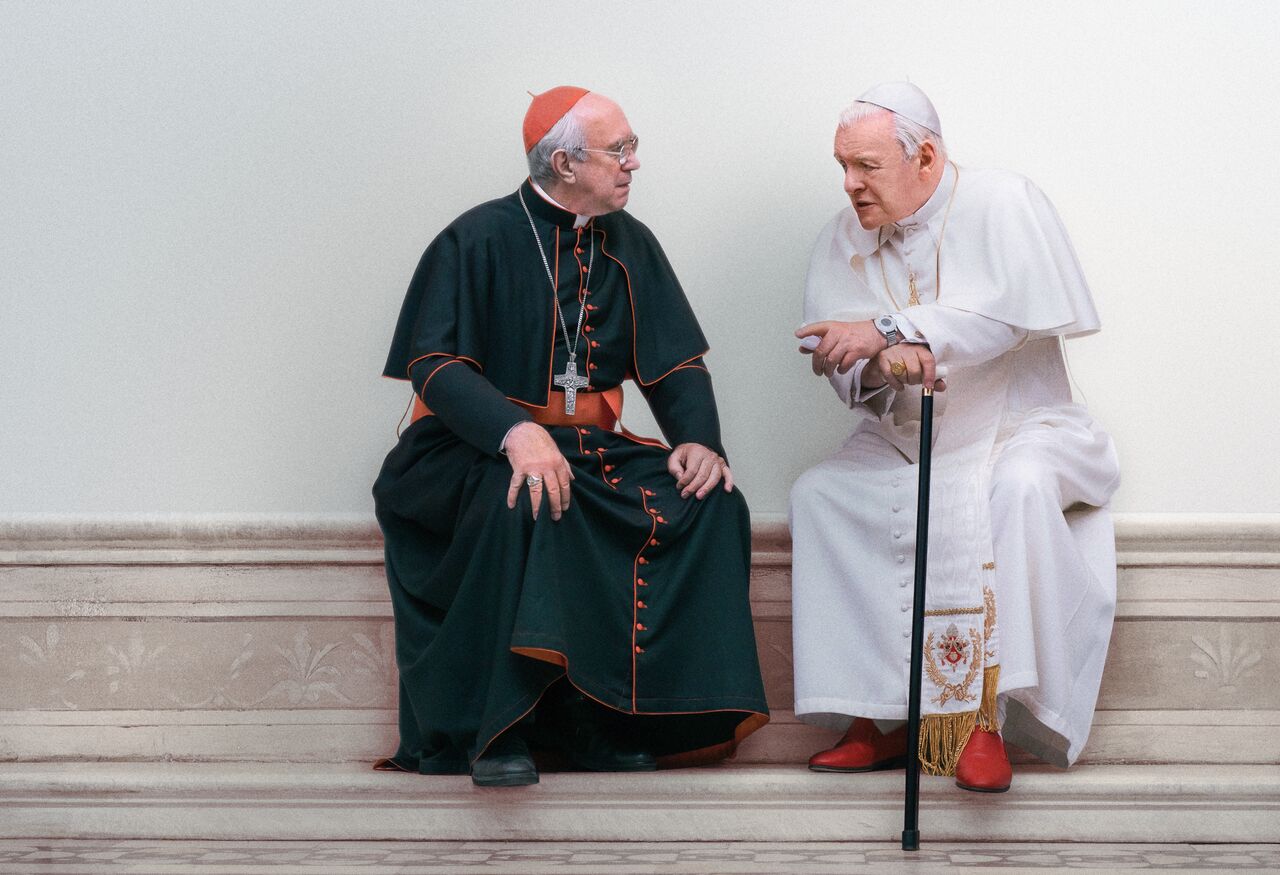The Two Popes
The Two Popes, 2019, 4 ¼ stars
Papal panache
Popes brings Benedict, Francis into semi-fictional focus

Jonathan Pryce, left, plays Pope Francis to Anthony Hopkins’ Pope Benedict in The Two Popes. (image courtesy Telluride Film Festival)
From The Orlando Weekly, December 11, 2019
Despite differing views of Catholic theology, Pope Benedict and Pope Francis are apparently good friends and have enjoyed each other’s company since Francis’s papal ascension in 2013. But no one can be sure of what they have discussed. If only walls could talk.
In The Two Popes, walls do talk. Chapels chatter. Ceilings sing. And together they speak one of the smartest and intellectually stimulating screenplays of the year.
Directed by Fernando Meirelles (The Constant Gardener) and written by Anthony McCarten, who based it on his 2017 play, The Pope, the film relays a mostly imagined series of conversations between the two popes prior to Benedict stepping down from the throne of Saint Peter. Not satisfied with Benedict’s explanation of advancing age and declining health, McCarten speculates as to the real reason for the exceedingly rare resignation and fantasizes about the role Francis and his comparatively radical philosophy might have played. This isn’t the first time McCarten has inserted fantasy into non-fiction, as he also penned The Theory of Everything, Darkest Hour and Bohemian Rhapsody, but The Two Popes plays more loosely with reality than those three films combined.
The talks take place both at the pope’s rural residence and in Rome. The Vatican does not accommodate filmmakers, however, so production designers had to re-create the Sistine Chapel and other locales, and the mix of practical sets and CGI is astonishing. But Meirelles isn’t content with a religious version of My Dinner with Andre. Instead, he infuses his film with boundlessly energetic, almost frenetic storytelling, relying on anachronistic music, unexpected humor, restless camerawork, quick cuts, changing aspect ratios, documentary footage and dialogue in at least five languages.
Meirelles and McCarten even insert a second, more factual narrative into the first. That additional story focuses on Francis’s life as a young man in Argentina, when he was known as Jorge Bergoglio. And though it adds complexity and moral ambiguity to the film, it occasionally feels muddled, even sandwiched-in. One can question that second story’s necessity, especially because it leaves less time for the captivating interplay between Benedict and Francis. But no one should question Meirelles’ command of his craft and passion for his story.
“I cannot play this role anymore,” Benedict tells Francis regarding his pending resignation. But Anthony Hopkins can, and then some, as the 81-year-old legend reminds us why he’s arguably the greatest actor of his generation. However, it’s Jonathan Pryce, as Francis, who has the slightly larger part, which he infuses with humanity, comedy and tenderness. Still, it’s Hopkins who is more likely to get the Oscar nomination in a crowded field. And though the film is, at its heart, a two-hander, Argentinian actor Juan Minujín is memorable as the young Bergoglio.
In his literary companion to the film, The Pope: Francis, Benedict, and the Decision That Shook the World, McCarten quotes Francis: “Sin is more than a stain that can be removed by a trip to the dry cleaner. It is a wound that needs to be treated, healed.”
Though cinema more often entertains, it can on rare occasions heal wounds both intellectual and spiritual. The Two Popes falls just short of that accomplishment, but it comes tantalizingly close.
© 2019 Orlando Weekly / MeierMovies, LLC
Note: I first reviewed this film in capsule form during the Telluride Film Festival.